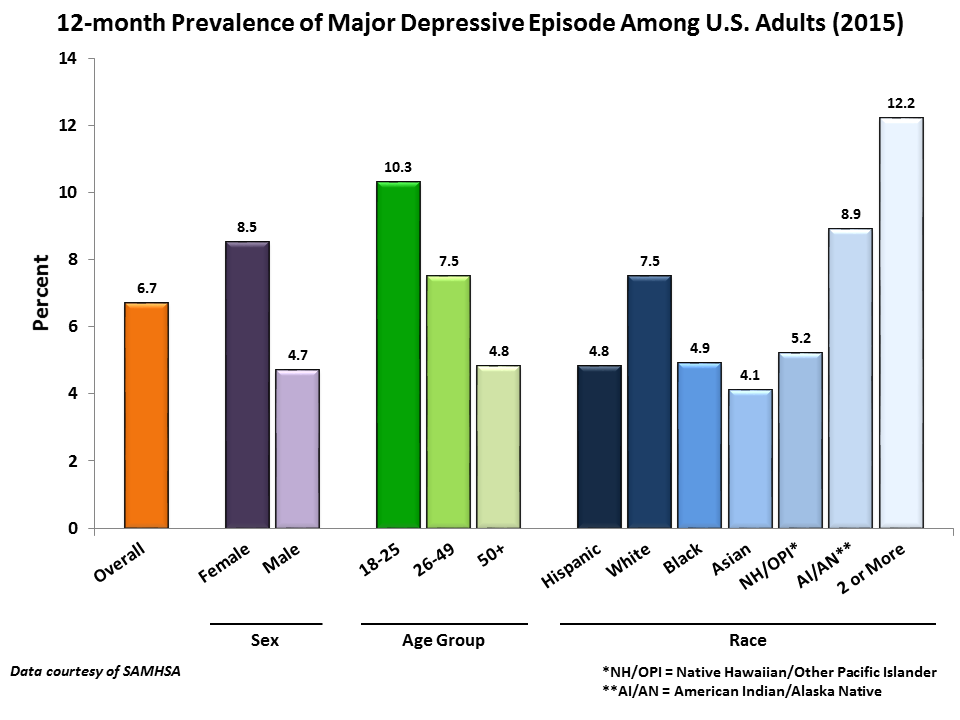Is persistent depressive disorder a disability? Does major depressive disorder qualify for disability? Can you get SSI for depression?
Here’s the short answer: if you suffer from a depressive disorder, you may qualify for Social Security benefits.
Of course, it’s a bit more complicated than that. In this post, we’re going to cover what depressive disorder is, and what the Social Security Administration (SSA) actually requires for someone to qualify for benefits.
Understanding Depressive Disorder
Pretty much everyone experiences sadness from time to time. After all, change and rejection are natural parts of life. However, if depression prevents you from working over an extended time frame, it may be a sign of depressive disorder.
The American Psychiatric Association (APA) says that common symptoms include lethargy, feeling worthless, and loss of interest in activities. According to the National Institute of Mental Health (NIMH), depression is fairly common among adults. The NIMH reports that stress and loss often cause the disorder. Other risk factors include major loss, childhood trauma, or a neurotic personality.

As shown in this chart by the NIMH, young adult women are most likely to suffer from major depressive disorder. However, it is still quite common among all demographics.
Depression and Social Security Disability: What You Need to Qualify
In the SSA listing for depressive disorder, it says that someone must be experiencing at least five of the following symptoms in order to qualify for benefits:
- Depressed mood
- Less interest in activities
- Change in appetite and weight
- Sleep issues
- Weakened physical and motor skills
- Decreased energy
- Guilt or worthlessness
- Difficulty concentrating or thinking
- Thoughts of suicide
While SSA is quite clear about symptom requirements, the limitation part is less straightforward. SSA’s listing requires that you not only fulfill the listed symptoms, but also prove that you have extreme limitation of one, or marked limitation of two, of the following four areas of mental functioning. These are detailed under section 12.04B in the listing:
- Understanding, remembering, or applying information
- Interacting with others
- Concentrating, persisting, or maintaining pace
- Either adapting or managing oneself
The terms “extreme” and “marked” are specifically described by the SSA. In this context, extreme means that “you are not able to function in this area independently, appropriately, effectively, and on a sustained basis.” Marked, on the other hand, means that “your functioning in this area independently, appropriately, effectively, and on a sustained basis is seriously limited.”
While these terms are defined in the SSA listing, they are still often subject to interpretation.
Understanding the “Sufficiently Limited” Mental Abilities Requirement
Another way to meet Social Security’s listing for depression is to prove that your mental disorder is “serious and persistent.” This is called the “C” criteria of the listing. “Serious and persistent” means that you have a medically documented history of the existence of the disorder over a period of at least 2 years, and there is evidence of both:
- Medical treatment, mental health therapy, psychosocial support(s), or a highly structured setting(s) that is ongoing and that diminishes the symptoms and signs of your mental disorder; and
- Marginal adjustment, that is, you have minimal capacity to adapt to changes in your environment or to demands that are not already part of your daily life.
What If I Don’t Meet the Depression (or Equal in Severity) Listing?
You still may qualify for benefits even if you do not satisfy the listing’s requirements. Social Security will evaluate the extent to which your depression, as well as your other physical and mental impairments affect your ability to perform work.
If Social Security determines that your functional capacity (called your Residual Functional Capacity) prevents you from performing your past work — or any other work — you will be found disabled. This is a complicated analysis where SSA will employ vocational experts to evaluate your past work and any other work to determine if you qualify for benefits. Your age, education, past work experience, and transferable skills will be considered.
Have questions about how this Social Security listing may apply to your own situation? Please fill out the form on our main page or call us at (773) 989-9899 or toll free at (888) 701-8222.
Originally published 6/26/2017. Updated 2/26/2021.
Author:
Richard I. Feingold
Richard I. Feingold & Associates, P.C.
Personal Injury & Social Security Disability
Stay Connected:
Sign up for our newsletter
Like us on Facebook
Connect on LinkedIn
Follow us on Twitter







